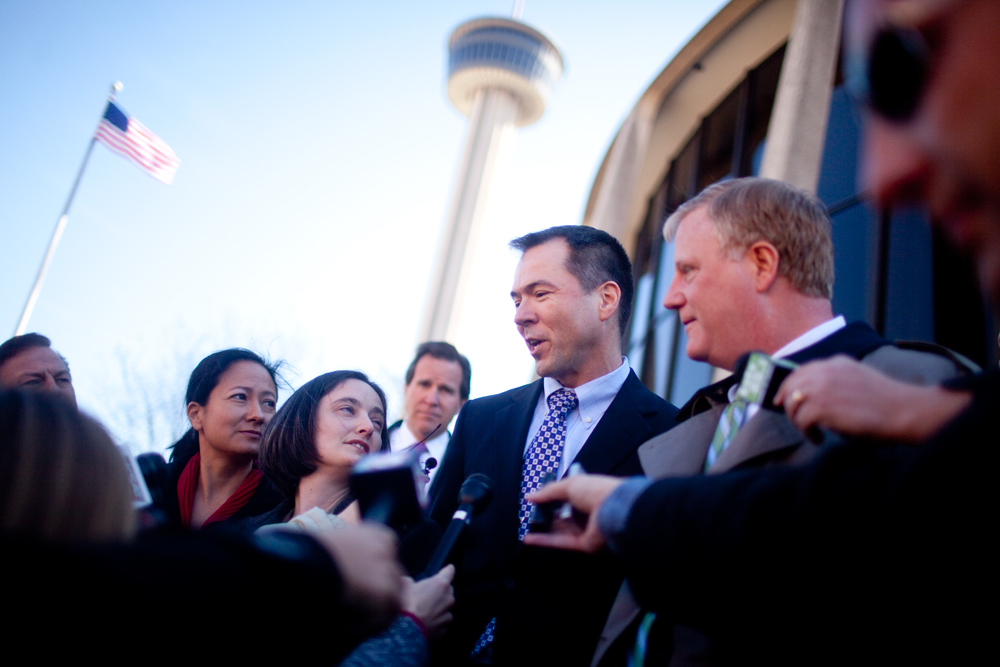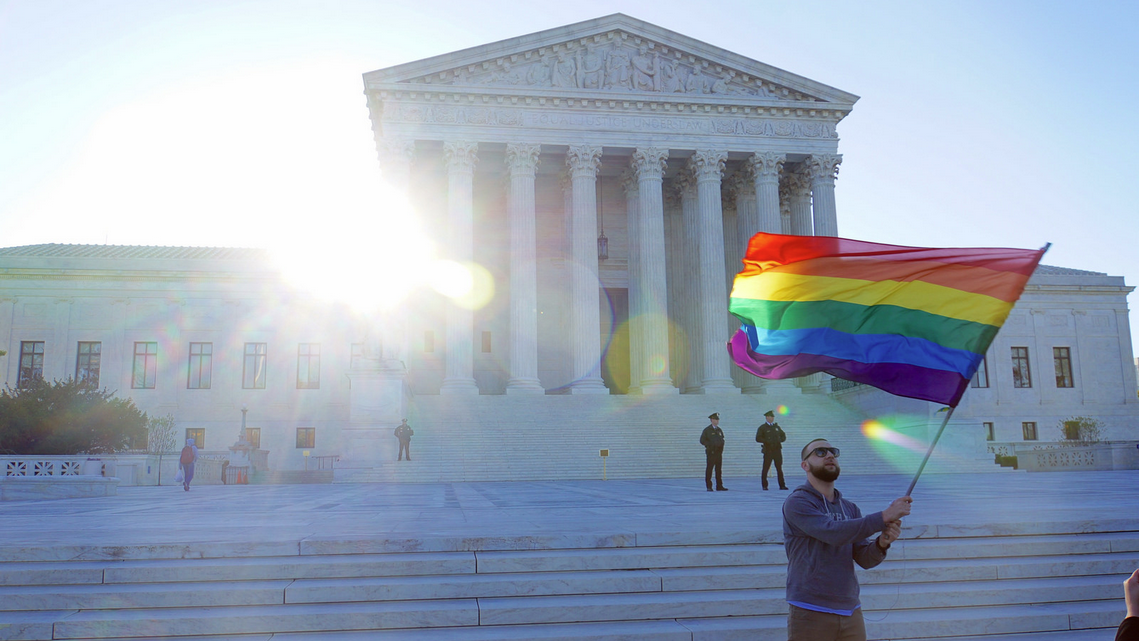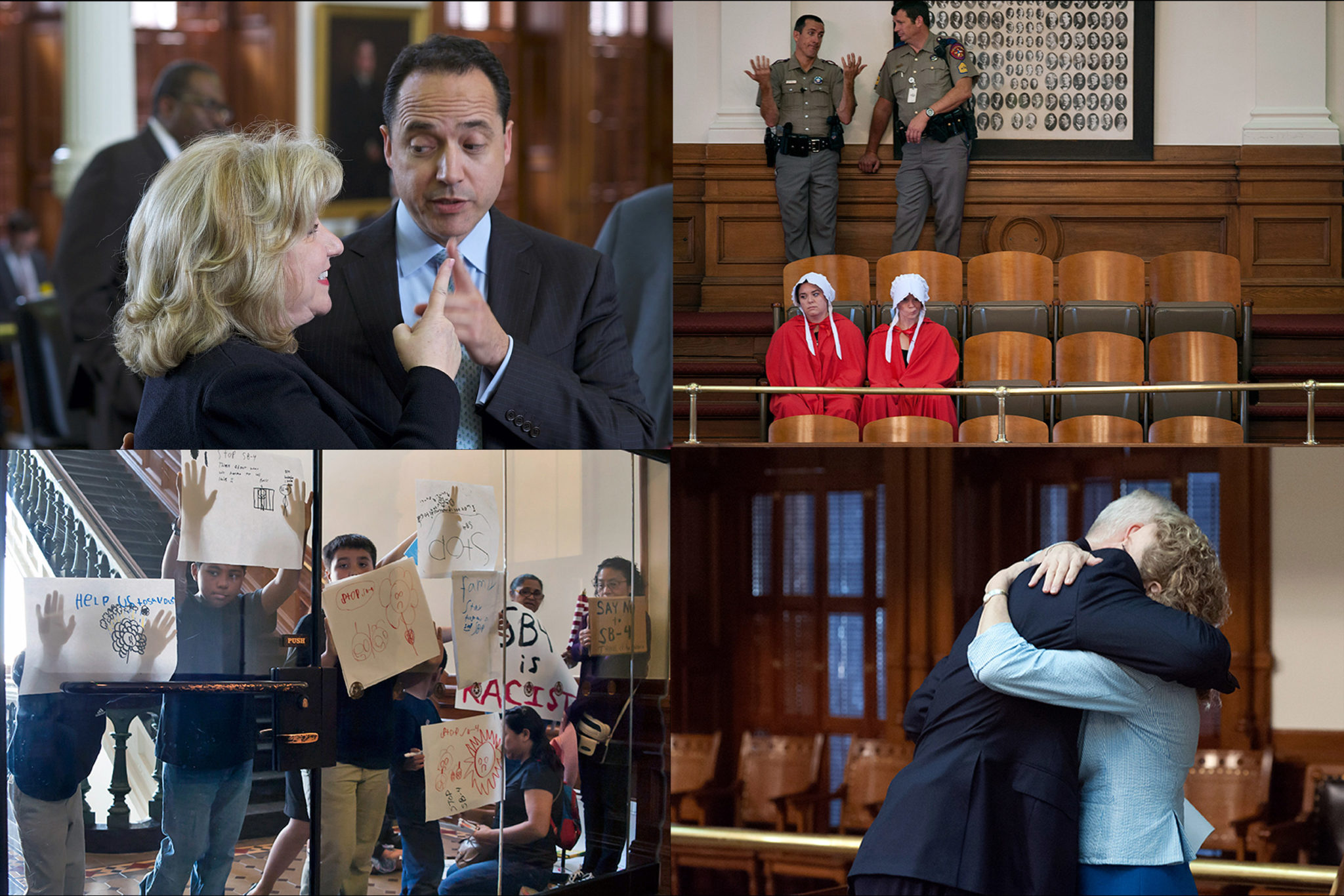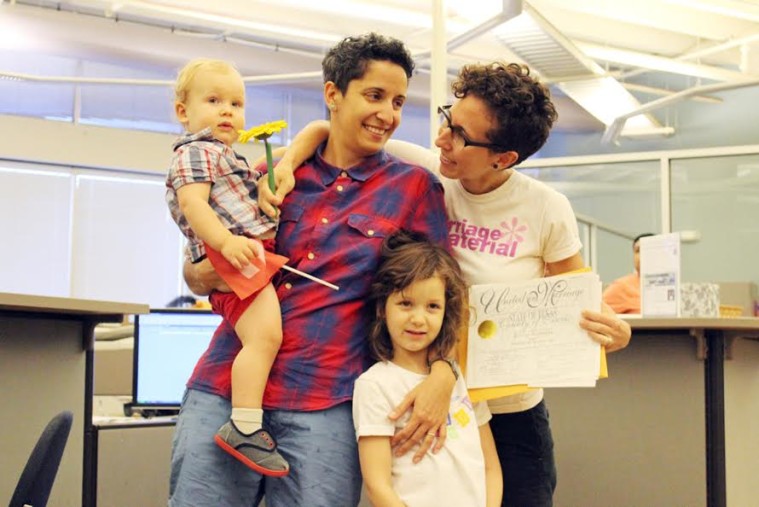
Federal Judge Calls Texas’ Same-Sex Marriage Ban Unconstitutional
Above: From left, Cleopatra De Leon, Nicole Dimetman, Vic Holmes and Mark Phariss, speak with reporters outside San Antonio's federal courthouse after oral arguments in their suit to overturn Texas' same-sex marriage ban. Their attorney Neel Lane is behind them.
Two weeks after hearing oral arguments in an attempt to overturn Texas’ ban on same-sex marriage, U.S. District Judge Orlando Garcia offered an early sign that he agrees the ban is unconstitutional.
On Wednesday, Garcia granted a preliminary injunction against further enforcement of Texas’ same-sex marriage ban, saying the two couples—two men from Plano and two Austin women—were likely to prevail at a trial. That would have allowed the two men to marry here, and let the two women to have their Massachusetts marriage recognized in Texas—except that Garcia also stayed his injunction pending a decision in the ultra-conservative U.S. Fifth Circuit Court of Appeals.
Today’s ruling doesn’t change much in practical terms—as the lawyers noted in court, because the suit isn’t a class action, the injunction would only have applied to the four plaintiffs anyway—but it’s being heralded as another small step in a nationwide march toward same-sex marriage that’s become more of a sprint in the last few months.
Garcia’s order, and the stay, recognized this lawsuit’s place as just one in a complex and fast-changing world of court rulings on same-sex marriage around the country, all leading to a likely resolution with the U.S. Supreme Court. But it also armed opponents of Texas’ 2005 ban with some powerful language. (You can read the whole thing below.)
Texas’ ban, Garcia wrote, “causes needless stigmatization and humiliation for children being raised by the loving same-sex couples being targeted.” That’s a direct response to the state’s main argument that Texas has an interest in kids growing up in healthy, loving families, which it argued couldn’t include those with same-sex parents. Anyway, as Garcia observes, “procreation is not and has never been a qualification for marriage.”
Garcia said the state never backed up its claim that letting gay and lesbian couples marry somehow harms heterosexual marriage. Texas’ ban, he writes, is unconstitutional because it violates the couples’ rights to equal protection, later adding, “this court does not find justification for the disparate treatment of homosexuals.”
“Today’s Court decision,” he writes, “is not made in defiance of the great people of Texas or the Texas Legislature, but in compliance with the United States Constitution and Supreme Court precedent.”
Responses to the ruling from politicians and activists came fast. The national group Freedom to Marry recognized that Garcia’s decision put Texas in league with Utah, Ohio, Oklahoma, Kentucky and Virginia, where judges have all recently tossed same-sex marriage bans. “With 47 marriage cases in 25 states now moving forward, and the possibility that a freedom to marry case will again reach the Supreme Court as soon as 2015, we must continue the conversations and progress—Texan to Texan, American to American—that show that all of America is ready for the freedom to marry,” said the group’s founder Evan Wolfson.
Republican lieutenant governor candidate Dan Patrick seemed momentarily swayed by Garcia’s reasoning this afternoon, tweeting, “MARRIAGE= ONE MAN & ONE MAN,” before copping to his own “oops” moment.
Like many Texas Republicans, Gov. Rick Perry largely stuck to a state’s rights argument.
“Texans spoke loud and clear by overwhelmingly voting to define marriage as a union between a man and a woman in our Constitution,” he said in a statement, “and it is not the role of the federal government to overturn the will of our citizens. The 10th Amendment guarantees Texas voters the freedom to make these decisions.”
Notably, Perry did not spend a lot of time moralizing about how banning same-sex marriage is for the “eternal benefit of our children,” as he did in 2005 when he signed legislation that put the ban in front of voters. Instead, marriage equality is now consigned to the same status as other “10th Amendment” issues—gun rights, environmental regulation and healthcare. And perhaps that’s a tacit reflection of how much things have changed since 2005, when Texas voters approved amending the state constitution to include a ban on same-sex marriage. The vote wasn’t even close: 76 percent to 24 percent. Of Texas’ 254 counties, the only one with a majority voting “no” was Travis County. Good old Republic of Austin.
Still, the special constitutional election hardly represented the permanent, conclusive “will of our citizens.” Turnout was only 17 percent and almost certainly skewed older, white and conservative relative to the state’s population. (Leaving aside, of course, the wisdom of putting rights to a vote.)
And in sociopolitical terms 2005 is a long, long time ago.
In 2005, only 29 Democrats in the Texas House voted against the proposed same-sex marriage ban—and many of those said they were only doing so for technical reasons. Here’s what former state Rep. Jim Dunnam, who was Democratic caucus chair at the time, and state Rep. Pete Gallego (now a congressman) had to say at the time:
“I fully agree that the institution of marriage should be limited to one man and one woman. I supported the Defense of Marriage Act, which is current Texas law. If that were the issue before us today, I would vote the same way again.”
Just in the past few years, there has been a seismic shift in public opinion on same-sex marriage. Texas has not been immune to this trend. Roughly 70 percent of Texans now support either same-sex marriage or civil unions (39 percent and 30 percent, respectively) and pro-marriage equality is the plurality view among Texans. While that’s still not a majority expressing support for allowing gays and lesbians to marry, the trend is pushing inexorably in that direction, as the courts have clearly recognized.
Even if the Supreme Court leaves this decision up to states, would Rick Perry be willing to put same-sex marriage to a vote again today? Should we test the will of the people again? How about in five years? Or 10?


